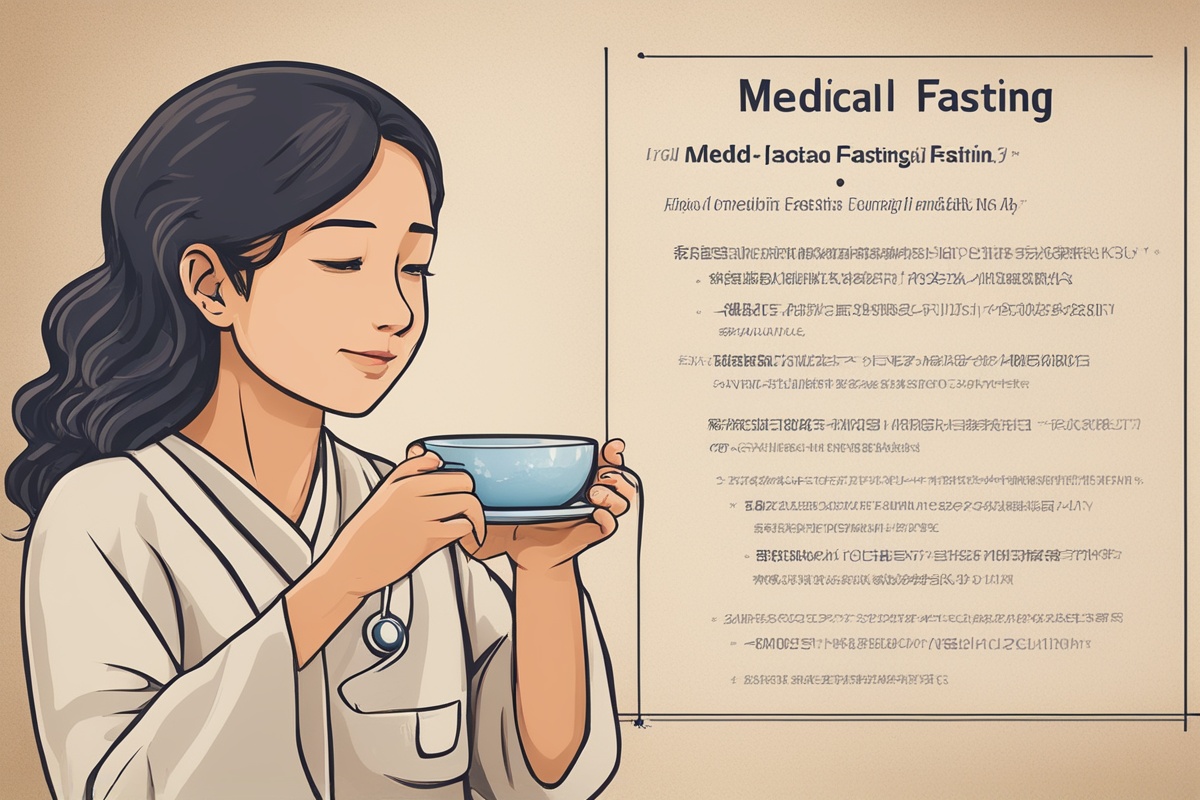Hey there, health enthusiasts! If you’ve ever considered fasting as a way to improve your well-being, you might have stumbled upon terms like intermittent fasting or water fasting. But today, we’re diving into a more structured and safe approach: medical supervision fasting. This method isn’t just about skipping meals; it’s a carefully monitored process that maximizes fasting benefits while minimizing risks. Whether you’re curious about weight loss, mental clarity, or cellular repair, this guide will walk you through the ins and outs of medically supervised fasting, backed by science and sprinkled with practical advice. Let’s explore how this powerful tool can transform your health under the watchful eye of professionals.
What Is Medical Supervision Fasting?
Medical supervision fasting refers to a fasting regimen conducted under the guidance of healthcare professionals, such as doctors, dietitians, or nutritionists. Unlike self-directed fasting, where you might follow a trendy 16:8 intermittent fasting plan, this approach involves personalized protocols tailored to your health needs. It often takes place in clinical settings or specialized wellness centers, ensuring that your body’s response to fasting is closely monitored. The primary goal? To harness the fasting benefits—like improved metabolic health and reduced inflammation—while avoiding potential pitfalls like nutrient deficiencies or dehydration.
This type of fasting can vary in duration and style. Some programs might involve a complete water fast for several days, while others incorporate low-calorie meal replacements or juice fasting. The key difference is the oversight: medical teams track vital signs, blood markers, and overall well-being to ensure safety. For anyone with pre-existing conditions like diabetes or heart disease, this level of care is a game-changer, making fasting accessible and sustainable.
Why Choose Medically Supervised Fasting Over DIY Methods?
Let’s be real—fasting on your own can feel like a gamble. Sure, you might read up on the health benefits of fasting and dive into a 24-hour fast, but without proper guidance, you risk side effects like dizziness, fatigue, or even long-term health issues. Medically supervised fasting flips the script by prioritizing safety. Healthcare providers assess your medical history, current health status, and goals before crafting a plan. They’re there to catch any red flags, like electrolyte imbalances, before they become serious (Wilhelmi de Toledo et al., 2019).
Beyond safety, this approach often yields better results. A supervised fast isn’t a one-size-fits-all deal; it’s customized. Want to focus on weight loss? Your doctor might design a longer fast with specific refeeding strategies. Aiming for mental clarity or reduced inflammation? They might pair fasting with supportive therapies like hydration protocols. The personalized touch ensures you’re not just fasting—you’re fasting smart.
Key Fasting Benefits Under Medical Supervision
The buzz around fasting isn’t just hype; there’s solid science backing its potential. When done under medical supervision, the fasting benefits are amplified because the process is optimized for your body. Here are some of the standout advantages, grounded in research:
- Weight Loss and Metabolic Health: Fasting can trigger fat-burning by lowering insulin levels and promoting ketosis, a state where your body uses fat for fuel. Studies show that supervised fasting leads to significant weight loss in obese individuals, often more effectively than standard diets (Johnstone, 2015).
- Cellular Repair and Longevity: During fasting, your body activates autophagy, a process where cells clean out damaged components. This “cellular housekeeping” is linked to reduced aging and disease risk (Mattson et al., 2017).
- Improved Mental Clarity: Many fasters report sharper focus and better mood, likely due to increased production of brain-derived neurotrophic factor (BDNF), a protein that supports brain health (Mattson et al., 2018).
- Reduced Inflammation: Chronic inflammation is a root cause of many diseases. Supervised fasting has been shown to lower inflammatory markers, offering relief for conditions like arthritis (Longo & Mattson, 2014).
These benefits aren’t just anecdotal—they’re measurable. Medical supervision ensures you’re fasting long enough to trigger these effects without pushing your body too far. It’s like having a personal coach for your health journey.
Who Should Consider Medically Supervised Fasting?
While the advantages of fasting are appealing, not everyone should jump into a fast—especially without guidance. Medically supervised fasting is particularly ideal for certain groups who need extra care or have specific health goals. Here are a few scenarios where this approach shines:
- Individuals with Chronic Conditions: If you have diabetes, hypertension, or kidney issues, fasting can be risky without oversight. Medical supervision adjusts protocols to manage blood sugar or blood pressure safely (Wilhelmi de Toledo et al., 2019).
- Those Seeking Significant Weight Loss: For people with obesity, longer fasts under supervision can kickstart weight loss while ensuring nutritional needs are met during refeeding.
- First-Time Fasters: If you’re new to fasting, starting with professional guidance helps you learn how your body responds and builds confidence for future fasts.
- People with Mental Health Goals: Fasting’s impact on mood and clarity can be profound, but it needs to be balanced with emotional support, which supervised programs often provide.
If you fall into one of these categories, supervised fasting could be your ticket to unlocking fasting health benefits without the guesswork. Always consult a healthcare provider before starting, especially if you’re on medications or have underlying conditions.
Practical Tips for a Successful Supervised Fasting Experience
Ready to explore medically supervised fasting? While your medical team will guide you, a little prep and mindset shift can go a long way. I’ve put together some actionable tips to help you make the most of this journey and fully embrace the benefits of fasting for health. These are based on both research and real-world experiences from fasting programs.
First, ease into it. Don’t expect to jump into a week-long water fast right away. Many supervised programs start with shorter fasts or modified diets to prepare your body. Follow your team’s pre-fast guidelines, which might include cutting back on sugar or caffeine a few days before. This reduces withdrawal symptoms like headaches. Hydration is also key—drink plenty of water leading up to and during the fast, as dehydration can sabotage even the best plans (Popkin et al., 2010).
Next, trust the process. Fasting can feel strange at first—hunger pangs, low energy, or irritability are common. But under supervision, you’ll have support to navigate these hurdles. Communicate openly with your medical team about how you’re feeling; they can adjust the plan if needed. Finally, focus on the refeeding phase. Breaking a fast isn’t just about eating again—it’s about reintroducing food slowly to avoid digestive issues. Your team will likely provide a structured menu, starting with light foods like broths or fruits.
Potential Risks and How Supervision Mitigates Them
Let’s not sugarcoat it—fasting isn’t without risks, especially if done improperly. Potential downsides include nutrient deficiencies, muscle loss, or even fainting if your body isn’t prepared. For some, prolonged fasting can mess with blood sugar levels or trigger disordered eating patterns (Trepanowski & Bloomer, 2010). That’s where medical supervision becomes a lifesaver. Regular check-ins, blood tests, and vital sign monitoring catch issues early. For instance, if your electrolytes dip too low, your team might provide supplements or adjust the fast’s duration.
Supervision also helps with the psychological side. Fasting can be mentally tough, and having a support system ensures you don’t feel isolated or overwhelmed. The goal is to reap the fasting benefits without compromising your long-term health. If you’re considering this path, choose a reputable program with certified professionals—don’t settle for less when it comes to your well-being.
As we wrap up, it’s clear that medically supervised fasting offers a unique way to tap into the health benefits of fasting with a safety net. It’s not about deprivation; it’s about resetting your body and mind under expert care. From weight loss to cellular repair, the perks are backed by science and tailored to your needs. If you’re intrigued by the idea of fasting but hesitant to go it alone, this could be your starting point. Take the leap—consult a healthcare provider or look for a trusted fasting clinic near you. Your journey to better health might just begin with a guided fast. Have you tried fasting before, or are you considering supervision for the first time? Drop your thoughts below—I’d love to hear your story!
References
- Johnstone, A. (2015). Fasting for weight loss: An effective strategy or latest dieting trend? International Journal of Obesity, 39(5), 727–733. https://doi.org/10.1038/ijo.2014.214
- Longo, V. D., & Mattson, M. P. (2014). Fasting: Molecular mechanisms and clinical applications. Cell Metabolism, 19(2), 181–192. https://doi.org/10.1016/j.cmet.2013.12.008
- Mattson, M. P., Moehl, K., Ghena, N., Schmaedick, M., & Cheng, A. (2018). Intermittent metabolic switching, neuroplasticity and brain health. Nature Reviews Neuroscience, 19(2), 63–80. https://doi.org/10.1038/nrn.2017.156
- Mattson, M. P., Longo, V. D., & Harvie, M. (2017). Impact of intermittent fasting on health and disease processes. Ageing Research Reviews, 39, 46–58. https://doi.org/10.1016/j.arr.2016.10.005
- Popkin, B. M., D’Anci, K. E., & Rosenberg, I. H. (2010). Water, hydration, and health. Nutrition Reviews, 68(8), 439–458. https://doi.org/10.1111/j.1753-4887.2010.00304.x
- Trepanowski, J. F., & Bloomer, R. J. (2010). The impact of religious fasting on human health. Nutrition Journal, 9, 57. https://doi.org/10.1186/1475-2891-9-57
- Wilhelmi de Toledo, F., Buchinger, A., Burggrabe, H., Hölz, G., Kuhn, C., Lischka, E., … & Stange, R. (2019). Fasting therapy for the treatment of chronic diseases: Consensus statement of an expert panel. Forschende Komplementärmedizin, 26(2), 57–66. https://doi.org/10.1159/000499155






